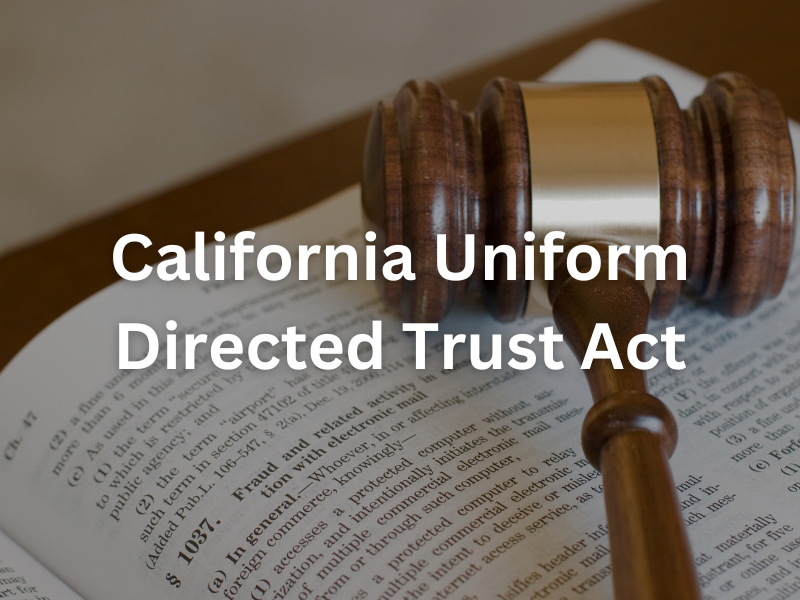
California has recently adopted a law that allows stronger supervision and management of trusts by allowing the creation of “directed” trusts in our state. When establishing a directed trust, the grantor (or funder) of the trust can assign some or all trust management duties to someone other than the trustee(s).
Traditionally, a trustee manages all of a trust’s assets and controls the distribution of proceeds to beneficiaries of the trust. However, for a directed trust, a second fiduciary may be appointed to manage one or more issues pertaining to the trust. For example, an individual might be appointed for business administration of a trust property, such as a family business held by a directed trust, or to manage certain investments that require specific knowledge or expertise.
The California Uniform Directed Trust Act (“UDTA”) became law on January 1, 2024. Under the UDTA, a trustee becomes a directed trustee who must carry out the trust director’s decisions within the scope of the trust director’s authority.
Under the law, a trust director is subject to the same rules as a trustee in a like position and “has the same fiduciary duty and liability … as a sole trustee in a like position and under similar circumstances … .” Further, California law requires a directed trustee to “take reasonable action to comply with a trust director’s exercise or non-exercise of a power of direction” unless “by complying, the trustee would engage in willful misconduct.”
The structure of a directed trust is intended to allow the division of duties. However, under the California UDTA, a trust director can take control of all aspects of trust administration, thereby making the directed trustee a mere agent of the trust director. In this article, the trial attorneys at Albertson & Davidson, LLP provide some insight into trust administration, the UDTA, and other elements of related trust laws.
Why Should a Trust be a Directed Trust?
 Trusts are a convenient way for parents to convey their assets to children and avoid the California probate process. However, a trust must be managed to ensure that the trust assets grow in a manner that serves the best interests of the beneficiaries and that it is administered with the highest level of integrity.
Trusts are a convenient way for parents to convey their assets to children and avoid the California probate process. However, a trust must be managed to ensure that the trust assets grow in a manner that serves the best interests of the beneficiaries and that it is administered with the highest level of integrity.
After establishing a trust, a trustee must be appointed to manage, preserve, and administer the trust. The trustee is considered a fiduciary, which makes them legally obligated to put the best interests of the trust and its beneficiaries above their own. A bad trustee who fails to meet their fiduciary duties may be removed through a trust contest and ordered to reimburse beneficiaries and the trust for any damages caused by their actions. In cases of trustee embezzlement or fraud, criminal penalties may apply.
Trustees are often expected to oversee the trust’s investments, regardless of whether they have training or experience in asset and wealth management or whether they have a conflict of interest. A corporate trustee may be named, but they may not have the flexibility to choose asset management solutions beyond their company’s offerings or contracted affiliations.
However, choosing a trust director to manage a trust’s investments allows the grantor to ensure the trust’s administration is managed with specific expertise. For example, an experienced real estate manager or developer might be appointed director of a trust holding several rental properties or undeveloped parcels of land. For a trust that holds a patent portfolio, it would be appropriate to appoint a director who understands intellectual property (IP) rights agreements, licensing fees, and royalty payments.
Meanwhile, a directed trustee for a trust that generates revenue might be primarily responsible for distributing that revenue to beneficiaries and maintaining and reporting associated accounting records.
Legal Complications Under Directed Trusts
The UDTA allows trust directors and directed trustees to assume compartmentalized duties without becoming liable for what the other does. Unless trust bylaws specifically say otherwise, trust directors are not required to monitor each other’s actions. They do not have to advise each other and do not have to warn trust beneficiaries or the grantor about any concerns they have about the co-trustees actions or decisions.
The law also protects the directed trustee who complies with questionable instructions from the trust director. It says, “A directed trustee shall not comply with a trust director’s exercise or non-exercise of a power of direction … to the extent that, by complying, the trustee would engage in willful misconduct.”
A directed trust can raise confusion and difficult questions concerning the roles of multiple fiduciaries, such as what duties each fiduciary owes to the trust’s beneficiaries. It’s easy to see that having multiple fiduciaries responsible for various aspects of a trust can create confusion and finger-pointing when something goes wrong. “Willful misconduct, a tort that is committed in an intentional and conscious way, is difficult to prove in a legal action.
If you are the beneficiary of a directed trust or an heir-at-law to the creator of the trust, you may need to file a trust contest if you suspect misconduct in the administration of the trust. You can petition the court to enforce the terms of the trust and to hold the trust director and trustee accountable for failure to comply with the trust’s terms. Under California trust law, you may be able to have the trust director and trustee(s) removed and replaced.
Talk to a California Trust Contest Lawyer
 The attorneys at Albertson & Davidson, LLP help individuals and families in California work through inheritance disputes involving probate law, estate planning, trust assets, and contested trusts. Our team of estate litigation attorneys has extensive litigation experience with complex and often emotionally charged inheritance matters. The law firm has recovered more than $250 million in court verdicts and negotiated settlements for clients.
The attorneys at Albertson & Davidson, LLP help individuals and families in California work through inheritance disputes involving probate law, estate planning, trust assets, and contested trusts. Our team of estate litigation attorneys has extensive litigation experience with complex and often emotionally charged inheritance matters. The law firm has recovered more than $250 million in court verdicts and negotiated settlements for clients.
Call (877) 408-3813 or reach out online to consult a trust contest lawyer. We handle California Uniform Directed Trust contest litigation on a contingency fee basis, meaning there are no up-front costs for you and no fee if we do not recover money for you. Our trusts and estates litigation law firm has offices in San Francisco, San Diego, Carlsbad, Redwood City, Irvine, and Los Angeles. Our firm’s guiding principles are embodied in this simple statement: “We stand. We fight. We win.”

